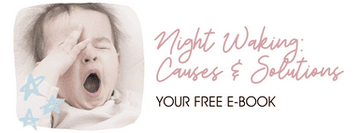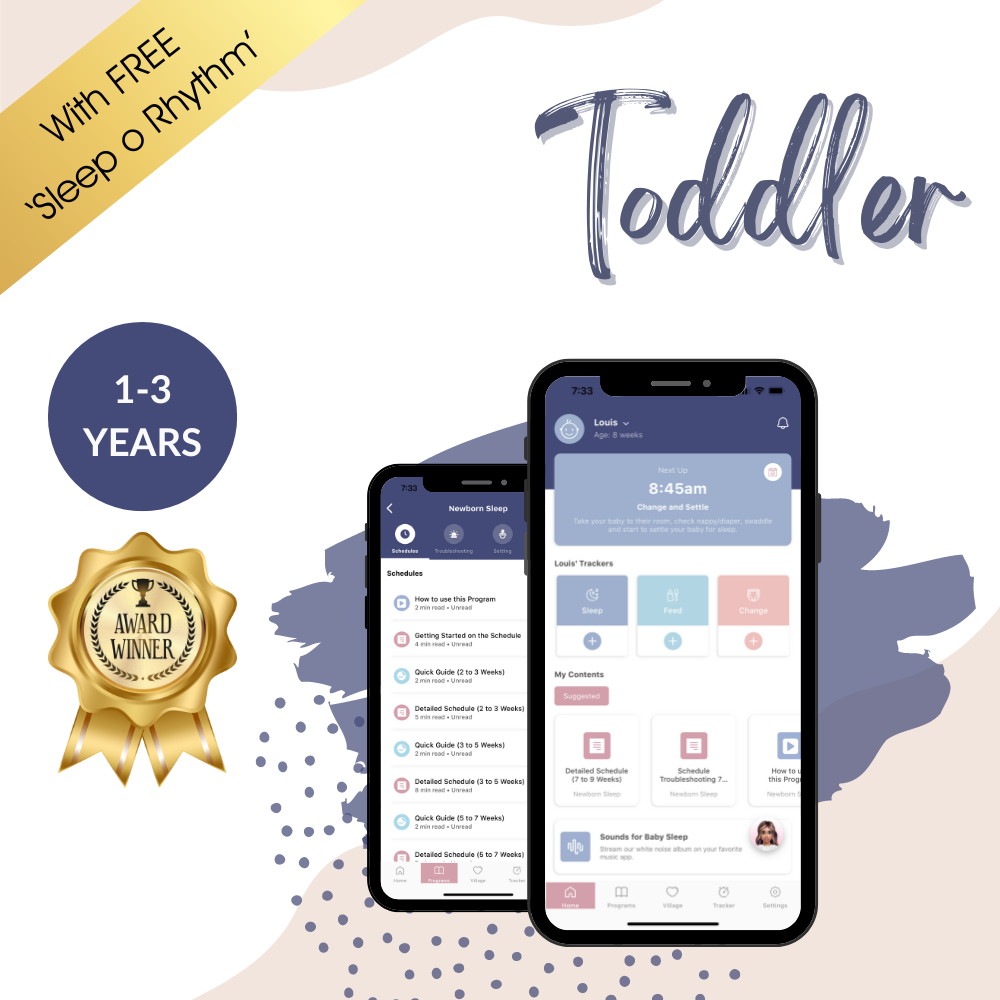
7 Month Old Sleep Schedule: Top Tips for Your Baby's Sleep
Helping your 7-month-old sleep can be a challenging task. At this age, babies are developing rapidly, which can affect their sleep patterns. They are in the throes of a nap transition, may have started solid food, and will have come into (and maybe not yet out of) the 4 month sleep regression which brings some significant changes to their sleep cycles. Understanding these changes is crucial for parents who want to support their little ones to sleep well.
Some key takeaways for your baby's sleep at this age are:
- The 7 month wake window is typically 2.5-4 hours (depending on the time of day). This is the time your baby can stay awake between naps. Recognizing this window can help in planning naps effectively.
- Sleep training methods can also be beneficial to guide to your little one to the skill of self-settling. It's important to choose a method that aligns with your parenting style.
- Creating a sleep-friendly environment is key. A dark room with a comfortable temperature and white noise can promote better sleep. Introducing a comfort object, like a small blanket or a lovey, can also help soothe your baby.
- Most importantly, be patient and flexible as you navigate this journey. With the right strategies, you can help your baby develop healthy sleep habits.
Let's get into it.
You can also have a read of this case study to discover how Sarah was able to help her 7 month old baby Lucas get his sleep back on track with focusing on his wake windows, sleep environment, nap schedule and settling ability.
Feeling confused about your baby's sleep needs?
Let our sleep experts help you every step of the way. Together we can solve your little one's sleep challenges
Get our Sleep Programs
Understanding 7 Month Sleep Needs
At seven months, your baby will likely need around 14-15 hours of sleep daily. This includes both nighttime sleep and naps during the day.
Babies at this age experience many developmental milestones. These can include rolling over, sitting up, or even starting to crawl. Such changes can impact sleep patterns as your baby’s brain is highly active.
Maintaining consistency is crucial for establishing a sleep routine. The regularity of nap times, feed times and bedtime helps set your baby’s internal clock, or circadian rhythm. Sticking to predictable patterns can improve sleep quality and lock in lasting sleep habits for years to come.
Here are some key aspects to consider when assessing sleep needs:
- Amount of total sleep needed in a 24-hour period
- Number and length of naps required
- Impact of developmental milestones on sleep patterns
Being aware of these factors will help you provide better support. This way, you’ll address your baby's sleep needs effectively and adapt as necessary.
The Ideal 7 Month Wake Window
Understanding the wake window for your 7-month-old can greatly enhance their settling ability and sleep quality. A wake window refers to the time your baby stays awake between sleep periods. At seven months, this window typically ranges between 2.5 to 4 hours (depending on the time of day).
Adjusting the wake window can prevent your baby from becoming overtired and will also ensure they're not under tired (which means they haven't been awake for long enough). Overtired (and undertired) babies often struggle to fall asleep and stay asleep. Observing your baby, and knowing what the ideal sleep schedule is for their age, will help you determine when they are becoming drowsy.
Keeping the wake window consistent helps regulate their sleep routine. It can also improve your baby’s mood and decrease fussiness. Recognizing the optimal wake window can lead to better nap times and restful nights.
A game changer in the world of baby sleep.
Using cutting edge technology, our Sleep-0-Rhythm automatically adjusts your little one's daily schedule based on sleep tracking events to make your life easier and your little one’s sleep schedule more manageable.
Get our Baby Sleep Program
Creating a 7 Month Sleep Routine (Bedtime Routine)
Establishing a sleep or bedtime routine is vital for your baby's sleep success. A consistent routine helps signal to your baby that it’s time to sleep. Routines provide babies with a sense of security, crucial for restful sleep.
Create a routine by choosing a calming pre-sleep activity and dim the lights if possible. Activities like reading or listening to lullabies are ideal. These activities should be soothing and consistent each night. From there, choose several steps you can repeat in a process each night - our top steps are bath, massage, PJs, milk feed, song or cuddle, bed.
Maintain consistency with bedtime and wake-up times. This regularity strengthens their internal body clock. It also helps your baby fall asleep more quickly and sleep more soundly.
Include the following in your 7-month-old’s sleep routine:
- A gentle bath to relax your baby before bed.
- A calm book or lullaby to soothe your baby’s senses.
- Dimming the lights to signal that it’s bedtime.
Avoid overstimulation close to bedtime. Busy activities can make it harder for your baby to settle. Quiet and calm are key to winding down their busy day.
Creating a predictable sleep routine is a great place to start to improve your little one's sleep. Encourage self-settling by placing your baby in their crib drowsy but awake; this helps them learn to fall asleep independently.
Sample Infant Sleep Schedule for 7 Months
Establishing a sleep schedule helps your baby navigate their day and feel secure. Babies at this age need about 14-15 hours of sleep per day.
A balanced schedule includes naps, awake times, feeds and night sleep. Typically, your baby will need two each day. Aim for a consistent nap schedule to support your baby's growth.
Here is a sample sleep schedule for a 7-month-old:
- 7:00 AM: Wake-up and feed
- 9:30 AM: Short morning nap
- 12:30 PM: Long lunchtime nap
- 4:45 PM: Very short afternoon nap (if needed, but hopefully not!)
- 6:30-7:00 PM: Bedtime
A regular bedtime and wake-up time helps maintain a healthy schedule.
Feeling confused about your baby's sleep needs?
Let our sleep experts help you every step of the way. Together we can solve your little one's sleep challenges
Get our Sleep Programs
7 Month Nap Schedule: How Many Naps and How Long?
At seven months, nap times are crucial for your baby's development. Naps help babies recharge and can improve nighttime settling and sleep quality.
Typically, babies at this age take two, sometimes three naps daily. From 6-8 months they are transitioning to just 2 naps but might need a third on days they haven't napped well.
Each nap lasts between 30 minutes to 2 hours and the time of day will dictate whether the nap is short or long. We recommend to have a shorter morning nap, then a longer lunch time sleep. This nap routine has many benefits, including:
- Stabilising a 7AM morning wake up and eliminating early morning waking
- The shorter morning nap enables the lunch nap to be longer and more consolidated
- The nap structure sets your little one up perfectly for easier settling at bedtime in the evening
- The daytime sleep allocation allows enough sleep pressure to grow to assist in better nighttime sleep
Recognizing Sleep Cues and Avoiding Overtiredness
Identifying your baby's sleep cues can help prevent overtiredness. Babies give subtle signals when they're ready to sleep.
Common cues include yawning, rubbing eyes, and fussiness. Some babies may also pull at their ears or have slower movements. Noticing these signs can help you start the nap routine at the right time, but it is important to also watch the clock as some babies tired signs aren't all that reliable!
Avoid letting your baby get overtired, as it can make sleeping more difficult. An overtired baby often struggles to settle down, which can lead to more frequent night wakings. Aim for a calm, stress-free environment to ease your baby into sleep. This approach promotes healthier and more restorative sleep patterns.
Get your little one’s sleep back on track.
Get guidance, advice & exclusive support through the sleep regressions, nap transitions and big sleep changes to come.
Get our Sleep Programs
Common Sleep Challenges at 7 Months
At seven months, babies often face new sleep challenges. Developmental milestones can disrupt their usual sleep patterns. These disruptions might seem sudden and bewildering to parents.
The 4 month sleep regression can be lingering at this age and there is another one looming at around 8-10 months old. Your baby might wake more often during the night or resist naps. This change is usually temporary but can be frustrating. In our Baby Sleep App we walk you through the changes that occur during this period, so you're never left guessing what is going on for your baby.
Several factors can contribute to sleep challenges:
- Impact from the 4 month sleep regression (if your baby hasn't learnt to self settle)
- Increased mobility leading to difficulty settling down
- Nap transition from 3 down to just 2 naps
Consistent routines and comforting bedtime rituals can help ease these challenges and support better sleep habits.
Sleep Training Methods for 7 Month Olds
Sleep training can be a game-changer for many families. Different methods can support your baby's sleep. It’s essential to choose the approach that aligns with your family’s needs.
The majority of parents using our Baby Sleep App use a variation of our gradual withdrawal method. To do this, you work with your baby's existing settling method (rock/fed/held to sleep) and gradually reduce your input. This method provides comfort while promoting independence in sleep.
Consistency is key in implementing sleep training techniques. It can take several nights for a baby to adjust. During this period, patience is vital to success.
Understanding and empathy are crucial during this transition for both the baby and the parents.
Factors to consider when selecting a method:
- Family lifestyle and values
- Baby's temperament and needs
Remember, sleep training is a personal decision. Make sure the chosen method feels right for you and your baby. Stay flexible and open to trying different approaches until you find one that works well.
Tips for a Sleep-Friendly Environment
Creating the right environment can significantly improve your baby's sleep. A calm, soothing room is key for quality rest. This helps signal to your baby that it's time to wind down.
Ensure the room is very dark. Consider using blackout curtains to block out light. White noise can comfort babies and help drown out household sounds, promoting uninterrupted sleep. We have a selection of white noise albums available on all streaming platforms.
Here are tips to create a sleep-friendly environment:
- Darkness
- Consistent room temperature (cool but comfortable)
- White noise
- Comfortable sleepwear and bedding
The room's temperature should be cool but not cold. Overheating may disrupt your baby's sleep and can pose safety risks. Comfortable, breathable clothing can enhance sleep quality (think natural fibres - cotton, bamboo, wool, merino).
Introduce a comfort object, like a lovey or small blanket. Familiar objects can be reassuring, helping your baby settle down more easily and form part of a bedtime routine. Comfort objects assist with transitions to new sleeping spaces and can provide comfort during times of separation anxiety (for example at daycare). My own child still has her cuddlies in her bed, at 9 years old! Remember, minor adjustments in the sleep environment can make a big difference in improving sleep quality.
Troubleshooting: When Sleep Isn’t Going Well
Sleep challenges can be frustrating for both parents and babies. If sleep isn’t improving, it may be time to try new strategies. Start by identifying any potential sleep disruptors.
Regularly review your sleep routine. Inconsistencies can confuse your baby, disrupting sleep patterns. Ensuring stability in timing and activities can be beneficial.
Here's a checklist to troubleshoot sleep issues:
- Review and adjust sleep routine consistency
- Monitor room environment for changes
- Consult an expert (like us!) for persistent sleep issues
Don't hesitate to seek guidance from a sleep expert if problems persist. Professional advice can provide reassurance and solutions to help your baby sleep better. Remember, patience and flexibility are essential in resolving sleep difficulties.
It's like having a sleep consultant in your pocket!
Help your family to sleep better with our Sleep Programs , trusted by medical professionals worldwide.
Get our Sleep Programs
Frequently Asked Questions About 7 Month Sleep
Parents often have questions about their baby's sleep patterns at 7 months. Common concerns revolve around sleep duration and routines. Understanding these can help ease anxieties.
One frequent question is about the typical sleep hours for a 7-month-old. Babies at this age usually require around 14-15 hours of total sleep daily, including naps and nighttime rest.
Parents also ask about coping with interrupted sleep. We would generally expect one overnight wake especially in a baby who isn't established on solid food yet, but we wouldn't expect to see constant night wakings in a baby this age.
Another concern is how to handle a baby resisting naps. The ideal wake windows and nap structure should guide parents on nap timing, preventing overtiredness.
Key Takeaways for Better 7 Month Sleep
Achieving better sleep for your 7-month-old requires knowledge of their sleep needs, consistency and patience. Tailor routines to your bay's age and developmental stage, focusing on your baby’s individual needs.
Consistency is crucial in establishing effective sleep patterns. Regular bedtime routines and a consistent wake-up time can help your baby’s sleep improve significantly. This also aids in regulating the baby’s internal clock.
Adapting to sleep cues and responding to changes as your baby grows will support sound sleep habits.
Here’s a quick list of key takeaways:
- Consistency in routines is important.
- Adapting to your baby's ever-changing needs is essential.
- Patience is key for long-term success.
These strategies can set the stage for healthier sleep patterns as your baby grows.
By Nicky Barker (BA, Grad. Dip Tch, University of Auckland), Pediatric Sleep Science Expert
---------------
Bibliography
Dewar, G. (2018). Baby sleep patterns: An evidence-based guide. [online] Available at: http://parentingscience.com/baby-sleep-patterns/ [Accessed 4 May 2022].
de Weerth, C., Zijl, R.H. and Buitelaar, J.K. (2003). Development of cortisol circadian rhythm in infancy. Early Human Development, [online] 73(1-2), pp.39–52. doi:10.1016/s0378-3782(03)00074-4.
Paul, I.M., Savage, J.S., Anzman-Frasca, S., Marini, M.E., Mindell, J.A. and Birch, L.L. (2016). INSIGHT Responsive Parenting Intervention and Infant Sleep. Pediatrics, [online] 138(1). doi:10.1542/peds.2016-0762.
St James-Roberts, I., Roberts, M., Hovish, K. and Owen, C. (2015). Video Evidence That London Infants Can Resettle Themselves Back to Sleep After Waking in the Night, as well as Sleep for Long Periods, by 3 Months of Age. Journal of Developmental & Behavioral Pediatrics, [online] 36(5), pp.324–329. doi:10.1097/dbp.0000000000000166.
Tham, E., Schneider, N., & Broekman, B. (2017). Infant sleep and its relation with cognition and growth: a narrative review. Nature and Science of Sleep, Volume 9, 135–149. https://doi.org/10.2147/nss.s125992

Receive product and services updates, promotional offers and other marketing communications based.





